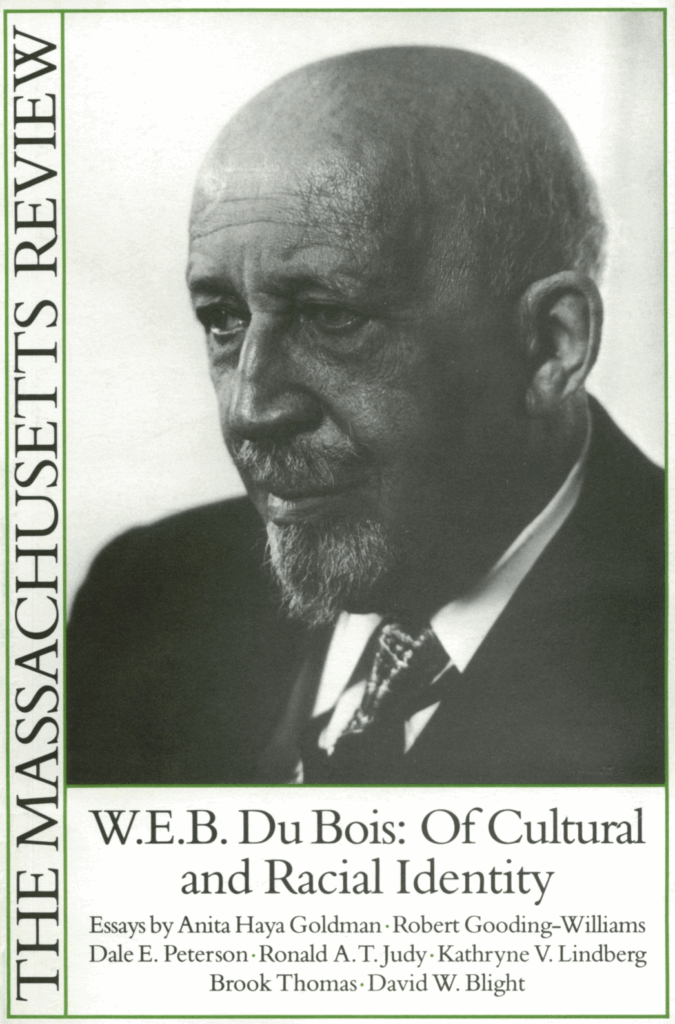Volume 35, Issue 2

FRONT COVER: Photograph of Du Bois
Whether we know it or not, Du Bois’s writing continues to shape our own thinking about issues of racial and cultural identity. To engage Du Bois, then, is to engage many of the concerns, questions, and perspectives which animate contemporary debates about these issues. As the essays collected here demonstrate, Du Bois’s abiding significance as a social theorist and philosopher of culture cannot be reduced, as often it is, to his still important commentary on the economic and educational policies advocated by Booker T. Washington. The Du Bois appearing in these essays subtly criticizes Ralph Waldo Emerson’s nationalism, as well as Alexander Crummell’s repudiation of “the word and the thought of slavery.” Exploring the idea of an authentic folk culture, along lines that bear fruitful comparison to Dostoyevsky’s treatment of the same idea, he also propounds a concept of black consciousness that is pertinent to appraising Greg Tate’s and Trey Ellis’s “New Black Aesthetic.” A Marxist historian who all but neglected the Spanish Civil War of which James Yates wrote so powerfully, the Du Bois we hear in these pages is, equally, a significant theorist of democracy who speaks cogently against Arthur Schlesinger, Jr.’s vision of a united America. By bringing Du Bois into dialogue with Emerson, Crummell, and Dostoyevsky, as well as with Tate, Ellis, Yates and Schlesinger, the contributors to this volume show him thinking race and culture, and adding his valuable, though sometimes problematic voice to our current efforts to contend with the questions he raises.
– Robert Gooding-Williams
For help in assembling this issue of The Massachusetts Review, I would like to thank the contributors, Linda Seidman of the W.E.B. Du Bois Archives at the University of Massachusetts and, especially, Jules Chametzky.
Table of Contents
W.E.B. Du Bois: Of Cultural and Racial Identity, introduction, by Robert Gooding-Williams
Negotiating Claims of Race and Rights: Du Bois, Emerson, and the Critique of Liberal Nationalism, Non-Fiction by Anita Haya Goldman
Du Bois’s Counter-Sublime, Non-Fiction by Robert Gooding-Williams
Notes from the Underworld: Dostoevsky, Du Bois, and the Discovery of Ethnic Soul, Non-Fiction by Dale Peterson
The New Black Aesthetic and W.E.B. Du Bois, or Hephaestus, Limping, Non-Fiction by Ronald Judy
W.E.B. Dubois’s Dusk of Dawn and James Yates’s ‘Mississippi to Madrid,’ or “What Goes Around Comes Around and Around and Around”, Non-Fiction by Kathryne V. Lindberg
Schlesinger and DuBois on the Old New World Order: A Prehistory of the Canon Wars, Non-Fiction by Thomas Brook
Lewis’s Du Bois: The Race Man As All Too Human Genius, Non-Fiction by David W. Blight
Contributors
David W. Blight, Associate Professor of History and Black Studies at Amherst College, is the author of Frederick Douglass’ Civil War: Keeping Faith in Jubilee (LSU Press, 1989) and an essay on W.E.B. Du Bois, forthcoming in History and Memory in Afro-American Culture (Oxford Univ. Press). He edited Narrative of the Life of Frederick Douglass, An American Slave for Bedford Books in 1993 and is currently at work on a book about race and American historical memory of the Civil War and Reconstruction.
Anita H. Goldman is an Assistant Professor of English at the University of Illinois, Chicago. An essay, “Comparative Identities: Exile in the Writings of Franz Fanon and W.E.B. Du Bois,” appeared in Selected Papers from the English Institute, 1992-1993, and a book, From Emerson to King: Democracy, Race, and the Politics of Protest, is forthcoming.
Robert Gooding-Williams, Professor of Philosophy and Black Studies at Amherst College, has written extensively on Du Bois and is currently completing a book on Nietzsche and Modernism. He edited Reading Rodney King: Reading Urban Uprising (Routledge, 1993).
Ronald A. T. Judy teaches in the Program of Literary and Cultural Theory in the Dept. of English at the University of Pittsburgh. He is the author of (Dis)forming the American Canon: The Vernacular of African Arabic American Slave Narrative.
Kathryne V. Lindberg, Professor of English at Wayne State University, has published a book, Reading Pound Reading: Modernism after Nietzsche (Oxford Univ. Press) and is working on a second, The Forbidden “Subject” of American Fascism.
Dale E. Peterson is Professor of English and Russian at Amherst College and is currently at work on a comparative study of the literature of Russian and African-American cultural nationalism.
Brook Thomas directs the Humanities Core Course at the University of California, Irvine. He has published several books including The New Historicism and Other Old-Fashioned Topics (Princeton Univ. Press) and Cross-examination of Cooper, Hawthorne, Stowe, and Melville (Cambridge Univ. Press). He will be a fellow at the Woodrow Wilson Center for 1994-95.


